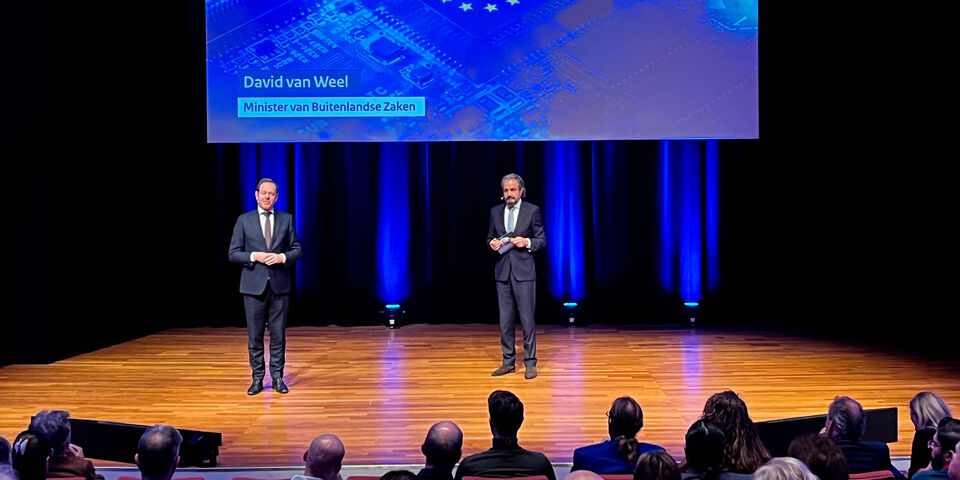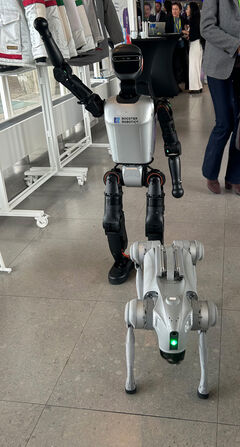Minister at Evoluon: “AI essential for security policy”
The Netherlands needs to accelerate the development of AI for the sake of national security, but in a safe and responsible way. That was the message from outgoing Minister of Foreign Affairs David van Weel on Thursday during the EAISI AI Summit at the Evoluon. The minister had offered himself as a speaker for the event.
The day opens on a cheerful note with Carlo van de Weijer, director of the Eindhoven Artificial Intelligence Systems Institute (EAISI), engaging in an absurdist conversation with one of the robots joining him on stage, debating whether he can trust “her.” With that, he introduces the summit’s central theme: how can we trust AI? The light-hearted atmosphere shifts quickly once Minister Van Weel takes the floor to discuss the trustworthiness of AI on the battlefield.
He explains that he recently visited Ukraine: “There, I saw with my own eyes how technology plays a crucial role in the country’s defense,” he says. AI helps, for example, with the rapid analysis of satellite imagery, the processing of drone footage, and the deployment of autonomous drones and robots.
Geopolitical power struggle
“Our intelligence services make no secret of the fact that current AI models increase all existing risks to the security of the Netherlands and Europe,” Van Weel notes. But he adds that the Netherlands also needs this technology to keep the country safe. In addition, according to him, other global powers are already using and deploying AI on a massive scale. “Artificial intelligence is at the center of an intense geopolitical power struggle. Back in 2017, Vladimir Putin said that whoever leads in artificial intelligence will rule the world. And in this case, he was right,” Van Weel says.
The Netherlands and Europe cannot afford to fall behind, he argues. The key is to accelerate, but responsibly. To the question how AI can be trusted on the battlefield, he does not offer a concrete answer.
Race to the bottom
Though, according to the minister, there must be a proper balance between regulation and room for innovation. Regulations should not stand in the way of innovation, but they must be strict enough to ensure ethical use. After his speech, someone from the audience asks what to do if the Netherlands wants to use AI ethically while other powers do not. Isn’t the country making things unnecessarily difficult by imposing rules that others ignore? Van Weel says the alternative is a “race to the bottom.” “What distinguishes us from our adversaries — including Russia — is that we have ethical standards. That is what we are willing to fight for.” If those standards are not upheld on the battlefield, he believes the battle is already lost.
That is why the Netherlands is committed to the responsible use of AI, he says. At the same time, both the Netherlands and Europe aim to stimulate its further development. He cites the example of twenty AI factories currently being built in Europe, including one in Groningen. He describes Brainport as an important technological hub and a key player in the field. “We urgently need your expertise,” Van Weel emphasizes.
Call to action
That message resonates with the audience, including Paul Merkus, member of the management team at EAISI. After the event, he notes clear parallels with a speech delivered earlier this year by Minister Brekelmans of Defense at the opening of the academic year at TU/e. “He issued a call to the university back then. Today, Van Weel essentially did the same to the AI community.”
According to Merkus, it is a call to build and strengthen knowledge in the field of AI because it is “super essential to our security.” He sees a role for the university in bringing that knowledge into the domain. Standing next to him is Paul Hofman of Library and Information Services (LIS), who shares that view. “Security is everyone’s responsibility; we can all contribute in our own way.” The fact that the minister addressed both opportunities and ethical concerns in his speech made the message feel trustworthy to him.
Robot dogs
In the lobby, two students from Tech United appear with robot dogs—the same ones that joined Carlo van de Weijer on stage. The smallest dog “fell asleep” during his talk. “The battery threw an error and I couldn’t get it out of its sitting position,” says BME student Jaime Scheepers with a laugh. “So it just lay down.”
Scheepers did not catch much of the minister’s speech because he was still occupied with the robot dog. But he does have an opinion when asked whether the Netherlands should fully commit to AI to avoid falling behind. “We shouldn’t be dependent on allies like the United States. But going all-in on AI isn’t a good idea. If you want to use AI, you have to have the ethical discussion about where and how you want to apply it.” The system itself also has to be reliable, he adds. “If you look at large language models, they’re mostly very confident at generating nonsense. If the AI you use for a drone behaves like that, that’s a real risk.”
This article was translated using AI-assisted tools and reviewed by an editor.



Discussion